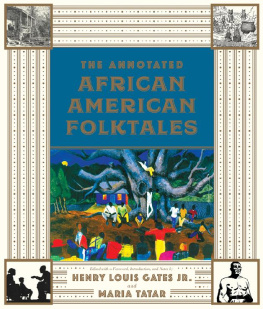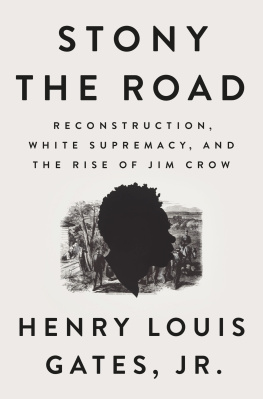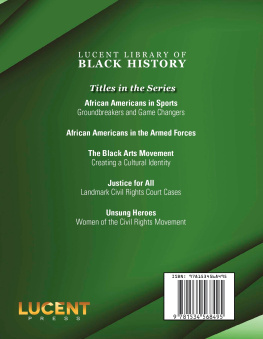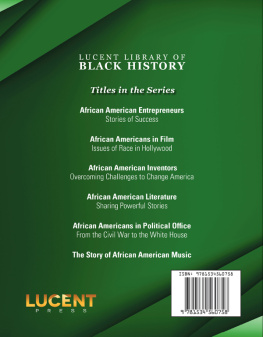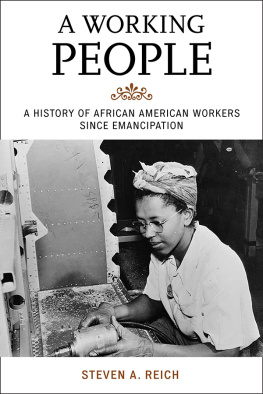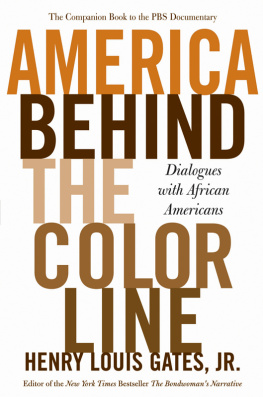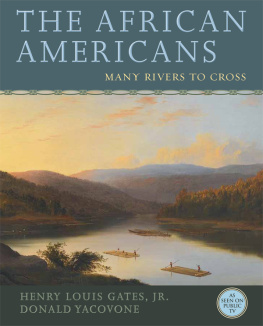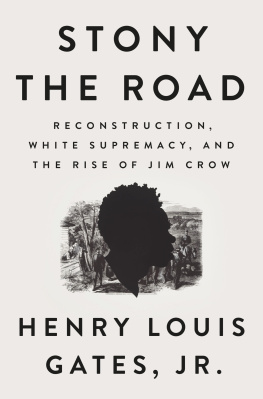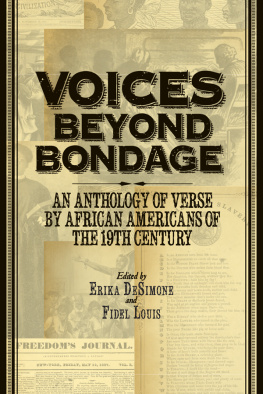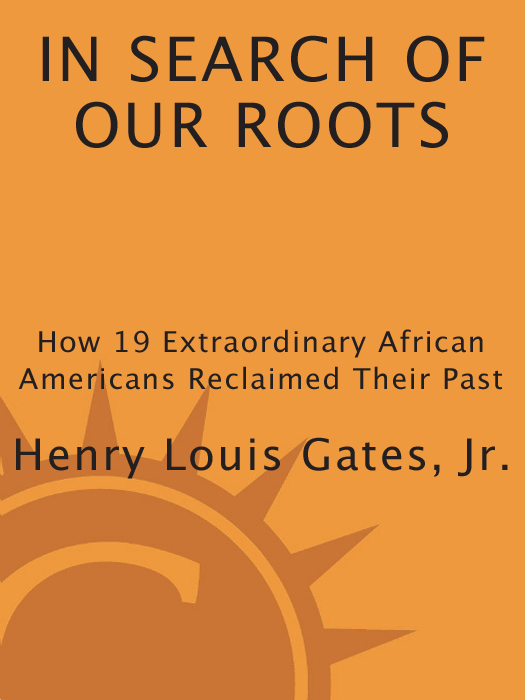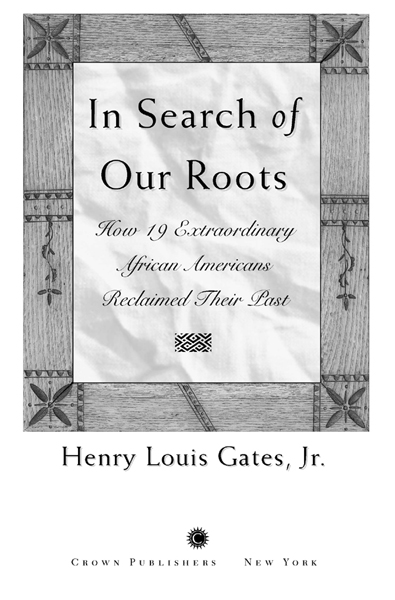Copyright 2009 by Henry Louis Gates, Jr.
All rights reserved.
Published in the United States by Crown Publishers, an imprint of the Crown Publishing Group, a division of
Random House, Inc., New York.
www.crownpublishing.com
CROWN and the Crown colophon are registered trademarks of
Random House, Inc.
Library of Congress Cataloging-in-Publication Data
Gates, Henry Louis.
In search of our roots: how 19 extraordinary African Americans
reclaimed their past / Henry Louis Gates, Jr.1st ed.
p. cm.
1. African AmericansGenealogy. 2. African AmericansBiography.
3. United StatesGenealogy. 4. AfricaGenealogy. I. Title.
E185.96.G384 2008
973.0496073dc22 2008011860
eISBN: 978-0-307-40973-7
v3.1
For Angela De Leon
Contents

Introduction:
Family Matters

M Y GRANDFATHER died in 1960. I was ten years old. I didnt know my grandfather well, but I was endlessly fascinated by himor, more correctly, by the way he looked. He looked like a tall white man to me, a white man with straight white hair, slender as a rail, with pencil thin lips, a white mans lips, the sort of lips that you paint onto a cartoon face with a single red line. I loved him, I suppose, insofar as you can love a person whom you never got to know. I loved him in the way that you love a grandparent with whom you have not had the opportunity to exchange intimacies, or to create them. I loved him because I was supposed to, formally, by contract, because my daddy did. I dont know what his relationship with his other grandchildren might have been, but Pop Gates, born in 1879, was not exactly big on carrying on conversations with his seventh sons second son. Hed pat me on my wooly, basketball-round head and give me a gracious and inviting smile, possibly bemused, I have since suspected many times, at how this nappy-headed milk chocolate-colored boy could have sprung from his light and bright and damned near white youngest sons loins. Standing next to my father at Pop Gatess open casket, just before the funeral director shut it forever, signaling the start of the service, I thought that my grandfather looked as if he had been turned to stone, an alabaster mask unexpectedly covering the blue-veined face of what had so shortly before been a flesh-and-blood human being, even if that flesh had been almost translucently white.
I thought he looked, well, hilarious, a ghostly white papier-mch mummy, and so I began to laugh. At the same time, it seemed, my father began to laugh as well. My dad has a deliciously wicked sense of humor, and part of getting to know himof overcoming my older brothers advantage of the firstborn son who had bonded so deeply with our father over sportswas recognizing and responding to his wit. I was ahead of him on this one, I remember thinking. Pop Gates looked just plain ridiculous lying in that purple-velvet-lined casket like an albino mannequin, I thought, and Pop apparently felt the same way. Too much talcum powder, perhaps? As I turned my face upward to share the joke with Daddy, I realized to my horror that not only was my father not laughing, he had begun to cry. Not only was he crying, he was weeping loudly, howling almost, big tears running down his own scarcely black face. I was so startled, so surprised, so taken aback that I had misread the entire situation, that I began to weep almost as loudly as my father. I appreciated that, boy, he said to me as we headed back to our seat in the front row of family mourners. Dont be ashamed, dont hold back. Just let it flow. Glancing around at the congregation through a sheet of sheer terror, afraid that I had embarrassed myself, and my father, by my inappropriate laughter, only then did I realize that no one had seen me, all souls in the Kight Funeral Home having been riveted, as I was, on the fact that my father, the funniest man I know, had, apparently for the first time in forty years, when a milk-truck had run over his foot while hed been sitting on a curb watching the results of a New York Giants baseball game on one of those 1920 state-of-the-art electric scoreboards, actually allowed himself to cry in front of somebody. And not just somebodyin this case in front of the whole town, or at least that segment of the colored people in town who mattered. It took me a long time to stop crying, so certain was I that someone had seen how foolishly Id acted, and in front of my own grandfathers porcelain dead body.
Following Pop Gatess burial at the Rose Hill Cemetery, where our people were among the very few Negroes allowed, well dead, to disturb the eternal sleep of Cumberland, Marylands, elite white Episcopal citizenry (the Episcopal churches had been segregated since 1890), my father took us back to the Gates family home on Greene Street, where Gateses had been living for almost a century. My brother and I followed my dad upstairs, to Pops and Nans bedroom. I had never been upstairs in my grandparents home before, I remember thinking as I sheepishly followed my dads footsteps.
Pop Gates had two hobbies, for the first of which he was quite well known in and around Cumberland: He could grow tulips like nobodys businesslike a Dutchman, people often said. As we followed my father, I couldnt help but notice that the walls of my grandparents living room were lined with framed sets of red, yellow, and blue ribbons. I wondered why tulips? Without saying a word, my father opened an old trunk, like something Id recently seen in a Disney movie about pirates. He pulled out dozens of musty leather books, partially used bank ledgers (Pop was a janitor at the bank), books with green and red lined pages, pages bound together with string when the glue had failed. As he slowly turned the pages, I realized that he was showing me scrapbooks, very ancient and disintegrating scrapbooks. The scrapbooks pages were covered completely, front and back, and were very stiff from the glue. So Pop Gates had kept scrapbooks; that was his second hobby. The articles that Pop Gates had clipped covered various news stories about World War II, local and national crime, accidents, and human interest items. There were hundreds and hundreds of news clips, mainly, all sorts of random headlines about births and deaths, especially murders and fatal accidents. Weddings and funeral notices. Funeral programs and that most curious genre, those laminated bookmarks noting the passing of the dead, complete with a bit of religious verse, a passage of the Bible, birth and death dates, and sometimes even a photograph of the deceased.
But above all else Pop was into obituaries. He had collected hundreds of obituaries; those scrapbooks were like an archive, decade by decade, of Cumberlands colored dead. And apparently not just colored people either; some dead white people (unless they were just light, like Pop) poked their pale visages out of those pages as well, fighting for air among clips of all those Negroes, probably more Negroes than they had ever been close to in their entire lives. Daddy wasnt saying anything to anybody, just silently turning those pages, page after page after oversize page. It was Pop Gatess cabinet of wonders, his mortuary of the Negro dead, with a couple of white folks thrown in for spice or good measure, I guess. I felt as if those scrapbooks were some sort of two-dimensional time machine, a black cardboard portal onto a world I would never know. Old-school Negroes, long dead. Clean, too: three-piece suits and white starched collars, hair slicked down or pressed. After a while it dawned on me that the white people and the colored people were dressed the same way: the sartorial equality of the recently departed, stemmed from the shared aesthetic of Olin Millss photography parlor. Who were these Negroes? I found myself beginning to wonder. Were these people Pops friends?


